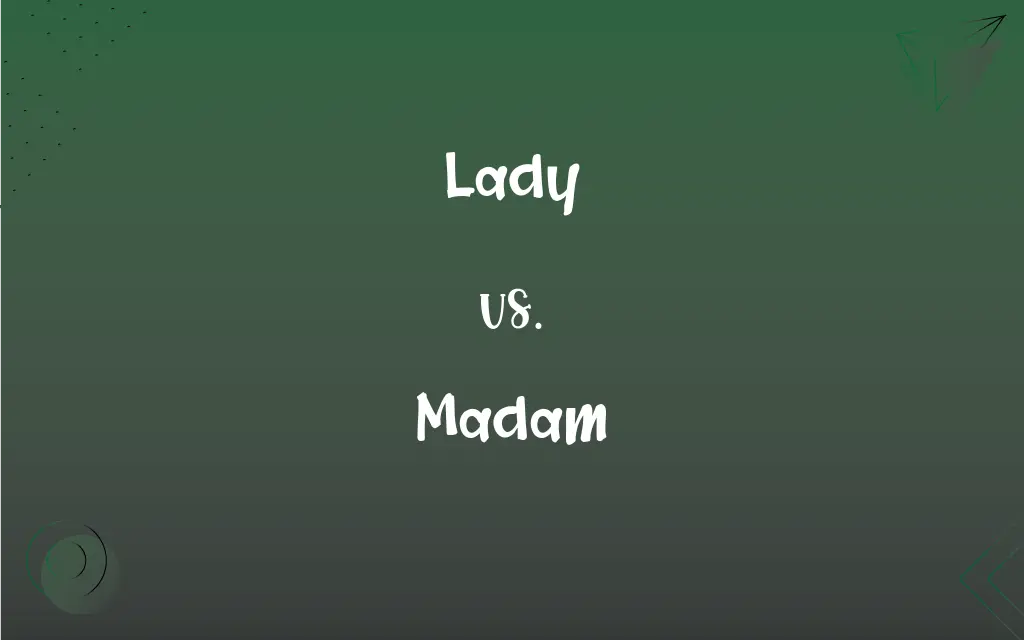Lady vs. Madam: What's the Difference?
By Aimie Carlson & Harlon Moss || Updated on March 4, 2024
"Lady" is a general term for a woman, often conveying respect or courtesy, and can also denote noble status. "Madam" is a formal title used to address women, especially those of higher social status or older, and is the female equivalent of "sir."

Key Differences
The term "lady" has a broad range of applications; it can refer to any woman regardless of her marital status or age, serving as a sign of respect in social contexts. Historically, "lady" is also used to denote noble rank or aristocracy, particularly in Britain, where it precedes the first name of a woman with a noble title, such as "Lady Diana Spencer." "Madam," on the other hand, is a more formal address and is traditionally used in direct communication, especially in formal or business settings. It is the female equivalent of "sir" and is used to show respect to women, often those who are older or in a position of authority.
In everyday use, "lady" implies politeness and can be used to address women in a respectful manner, often in public settings or when the speaker wishes to emphasize courtesy. "Madam" can also precede the name of a woman running a business, like a boarding house or a brothel, and is used in some English-speaking countries as a polite way to address female customers or clients, such as "Madam Chair" or "Madam President" in formal or official contexts.
The usage of "lady" and "madam" also reflects cultural and linguistic nuances. While "lady" can be used more broadly and casually, "madam" carries a more formal tone and is often associated with higher social status or professional settings. In some regions, the abbreviated form "ma'am" is commonly used as a less formal alternative to "madam," especially in spoken English, to convey respect in a more casual or everyday context.
Choosing between "lady" and "madam" depends on the situation, the relationship between the individuals involved, and cultural norms. While both terms are used to convey respect, their usage can vary significantly based on context, region, and personal preference.
Comparison Chart
Usage
Broad, for any woman; denotes nobility in specific contexts.
Formal address for women, especially older or in authority.
ADVERTISEMENT
Connotation
Respect, courtesy; can indicate noble status.
Formality, respect, especially in professional settings.
Equivalent
General term for women.
Female equivalent of "sir."
Context
Social, everyday use; aristocracy.
Formal, business, official titles.
Variants
"Ladies" as plural.
"Ma'am" as a less formal alternative.
Lady and Madam Definitions
Lady
Implies politeness and respect.
He offered his seat to an elderly lady on the bus.
ADVERTISEMENT
Madam
Indicates respect in professional settings.
Madam, your table is ready.
Lady
A woman of high social standing or refinement, especially when viewed as dignified or well-mannered.
Madam
"Ma'am" as a common, less formal variant.
Excuse me, ma'am, you dropped your wallet.
Lady
A woman who is the head of a household
Is the lady of the house at home?.
Madam
Used for women of higher social status or age.
May I help you, madam?
Lady
A woman, especially when spoken of or to in a polite way
Ladies, may I show you to your table?.
Madam
Pl. Mes·dames (mā-dăm, -däm) Used formerly as a courtesy title before a woman's given name but now used only before a surname or title indicating rank or office
Madam Ambassador.
Lady
Used as a form of address for a woman, often with sarcasm or irritation
Look, lady, I was ahead of you in line.
Madam
Used as a salutation in a letter
Dear Madam or Sir.
Lady
A woman who is the object of romantic or chivalrous love
A knight serving his lady.
Madam
Madam Used as a form of polite address for a woman
Right this way, madam.
Lady
(Informal) A wife or girlfriend
A man kissing his lady at the airport.
Madam
Madam The mistress of a household.
Lady
A lady in waiting
The queen and her ladies.
Madam
Madam A woman who manages a brothel.
Lady
A general feminine title of nobility and other rank, specifically as the title for the wife or widow of a knight or baronet.
Madam
A polite form of address for a woman or lady.
Mrs Grey wondered if the outfit she was trying on made her look fat. The sales assistant just said, “It suits you, madam”.
Later, Mrs Grey was sitting in her favourite tea shop. “Would madam like the usual cream cakes and patisserie with her tea?” the waitress asked.
Lady
Used as a form of address for a woman of high rank, especially for a marchioness, countess, viscountess, baroness, or baronetess.
Madam
The mistress of a household.
Lady
(historical) The mistress of a household.
Madam
(colloquial) A conceited or quarrelsome girl.
Selina kept pushing and shoving during musical chairs. The nursery school teacher said she was a bad-tempered little madam.
Lady
A woman of breeding or higher class, a woman of authority.
"I would like the dining room to be fully set by tonight; would you do so?" "Yes, my lady".
Madam
An irritable, conceited, or contemptous woman. (used as a general term of abuse).
Lady
The feminine of lord.
Madam
(transitive) To address as "madam".
Lady
A title for someone married to a lord or gentleman.
Madam
A gentlewoman; - an appellation or courteous form of address given to a lady, especially an elderly or a married lady; - much used in the address, at the beginning of a letter, to a woman. The corresponding word in addressing a man is Sir; often abbreviated ma'am when used as a term of address.
Lady
A title that can be used instead of the formal terms of marchioness, countess, viscountess, or baroness.
Madam
The woman who is in charge of a household.
Lady
A woman: an adult female human.
Please direct this lady to the soft furnishings department.
Madam
The woman who is in charge of a brothel.
Lady
(in the plural) A polite reference or form of address to women.
Ladies and gentlemen, it is a pleasure to be here today. Follow me, ladies!
Madam
A woman of refinement;
A chauffeur opened the door of the limousine for the grand lady
Lady
(slang) Used to address a female.
Hey, lady, move your car!
Hey, ladies, how are you doing?
Madam
A woman who runs a house of prostitution
Lady
(ladies' or ladies) Toilets intended for use by women.
Madam
Formal address for women, equivalent to "sir" for men.
Madam President chaired the meeting.
Lady
(informal) A wife or girlfriend; a sweetheart.
Madam
Can precede a name in titles of authority.
Madam Secretary will address the issue.
Lady
A woman to whom the particular homage of a knight was paid; a woman to whom one is devoted or bound.
Lady
Who is a woman.
A lady doctor.
Lady
(Wicca) Lady.
Lady
A five-pound note. (Rhyming slang, Lady Godiva for fiver.)
Lady
A queen.
Lady
To address as “lady”.
Lady
A woman who looks after the domestic affairs of a family; a mistress; the female head of a household.
Agar, the handmaiden of Sara, whence comest thou, and whither goest thou? The which answered, Fro the face of Sara my lady.
Lady
A woman having proprietary rights or authority; mistress; - a feminine correlative of lord.
Of all these bounds, even from this line to this, . . . We make thee lady.
Lady
A woman to whom the particular homage of a knight was paid; a woman to whom one is devoted or bound; a sweetheart.
The soldier here his wasted store supplies,And takes new valor from his lady's eyes.
Lady
A woman of social distinction or position. In England, a title prefixed to the name of any woman whose husband is not of lower rank than a baron, or whose father was a nobleman not lower than an earl. The wife of a baronet or knight has the title of Lady by courtesy, but not by right.
Lady
A woman of refined or gentle manners; a well-bred woman; - the feminine correlative of gentleman.
Lady
A wife; - not now in approved usage.
Lady
Any woman; as, a lounge for ladies; a cleaning lady; also used in combination; as, saleslady.
Lady
The triturating apparatus in the stomach of a lobster; - so called from a fancied resemblance to a seated female figure. It consists of calcareous plates.
Lady
Belonging or becoming to a lady; ladylike.
Lady
A polite name for any woman;
A nice lady at the library helped me
Lady
A woman of refinement;
A chauffeur opened the door of the limousine for the grand lady
Lady
A woman of the peerage in Britain
Lady
A term of respect for women.
The lady at the store was very helpful.
Lady
Denotes noble rank or aristocracy.
Lady Mary Crawley is a character in Downton Abbey.
Lady
Used in polite or courteous reference.
Ladies and gentlemen, please take your seats.
Lady
Can refer to any woman, often in public settings.
There's a lady at the door asking for you.
FAQs
Is "lady" only used for women of noble rank?
No, "lady" is used both for women of noble rank and more generally for any woman, often as a sign of respect or courtesy.
Can "madam" be used for young women?
While traditionally used for older or married women, "madam" can be used for young women in very formal settings, though "miss" might be more common.
How do you decide between using "madam" and "ma'am"?
"Madam" is more formal and often used in written address or formal speech, while "ma'am" is more commonly used in everyday spoken English, especially in the US.
Is it appropriate to use "lady" or "madam" in all situations?
The appropriateness depends on the context, cultural norms, and the preference of the person being addressed. "Lady" is more versatile, while "madam" is best reserved for formal situations.
In what languages is "madam" used outside of English?
"Madam" or its equivalents are used in several languages, often borrowed from French ("madame") and adapted into languages like Dutch, German, and others for formal address.
How do you address a letter to a woman without knowing her marital status?
If unsure of marital status, "Ms." is a safe and respectful option that does not denote marital status, unlike "Miss" or "Mrs."
Can "lady" be considered patronizing or demeaning?
Depending on the context and tone, "lady" can be seen as respectful or potentially patronizing. Awareness of the situation and the preferences of the person being addressed is important.
Are there modern alternatives to "lady" and "madam"?
In many contexts, using a woman's name or asking for preferred titles can be more appropriate and respectful, reflecting modern sensibilities towards gender and respect.
How has the usage of "lady" and "madam" evolved over time?
The usage of both terms has evolved, with "lady" becoming more generalized and "madam" retaining its formal connotation but becoming less common in everyday speech.
What is the historical origin of "lady" and "madam"?
"Lady" originates from Old English, meaning "bread kneader" or "wife," while "madam" comes from the French "madame," originally meaning "my lady" in medieval French.
How does the use of "lady" and "madam" vary internationally?
The use of "lady" and "madam" varies by culture, with "madam" being more formal and used in specific contexts, while "lady" has broader use. Cultural norms influence the perceived respectfulness of each term.
Are there any feminist critiques of the terms "lady" and "madam"?
Yes, feminist critiques sometimes argue that terms like "lady" and "madam" can reinforce traditional gender roles or expectations, suggesting a preference for neutral or professional titles.
What is the correct plural form of "madam"?
The correct plural form of "madam" is "madams" in general contexts, but in formal addresses or titles, "Mesdames" (borrowed from French) is often used.
Is "lady" used in titles outside of the nobility?
Yes, "lady" can be used in titles outside of nobility, such as in certain professions or roles, like "First Lady" or in informal contexts to denote respect.
Can "lady" and "madam" be used interchangeably?
While both convey respect, their usage depends on context; "lady" is more versatile, and "madam" is reserved for formal address or when specifically denoting respect or authority.
What is the etiquette for using "lady" and "madam" in business settings?
In business settings, "madam" can be used in formal communication, while "Ms." or the person's professional title might be more common. Using "lady" might be less appropriate unless referring to a group in a general sense, such as "ladies and gentlemen."
Can "lady" or "madam" be used to address a group of women?
"Ladies" is commonly used to address a group of women, especially in greetings or announcements, such as "Ladies, please gather here." "Madams," while grammatically correct, is less commonly used to address groups in English.
Can men be referred to as "madam" in any context?
Traditionally, "madam" is exclusively used to address women. For men, equivalent terms like "sir" or "mister" are used.
In what situations might "madam" be considered too formal?
"Madam" might be considered too formal in casual or informal settings, where first names or less formal titles are typically used.
How do younger generations perceive the use of "lady" and "madam"?
Younger generations may perceive "lady" and "madam" as outdated or overly formal, preferring first-name basis interactions or more gender-neutral terms.
About Author
Written by
Aimie CarlsonAimie Carlson, holding a master's degree in English literature, is a fervent English language enthusiast. She lends her writing talents to Difference Wiki, a prominent website that specializes in comparisons, offering readers insightful analyses that both captivate and inform.
Co-written by
Harlon MossHarlon is a seasoned quality moderator and accomplished content writer for Difference Wiki. An alumnus of the prestigious University of California, he earned his degree in Computer Science. Leveraging his academic background, Harlon brings a meticulous and informed perspective to his work, ensuring content accuracy and excellence.































































